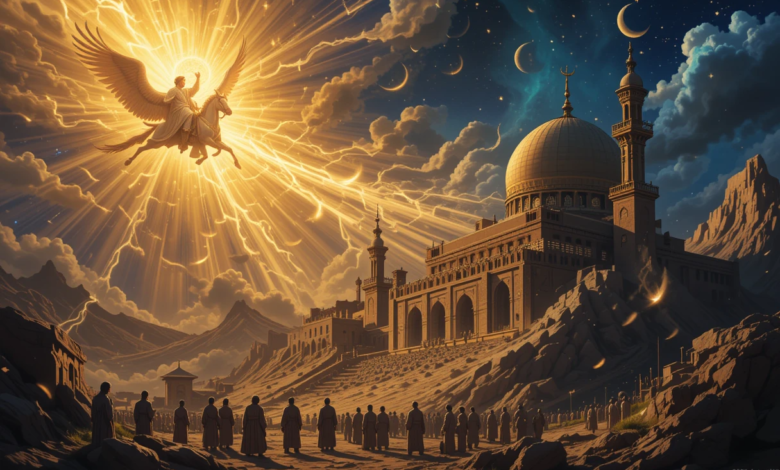Shab-e-Meraj: The Night of Ascension and Spiritual Reflection

Shab-e-Meraj (شب معراج), also known as the Night of Ascension, is one of the most significant events in Islamic history, celebrated by Muslims worldwide. It is believed to be the night when the Prophet Muhammad (PBUH) ascended to the heavens in a miraculous journey known as the Isra and Mi’raj. This night holds deep spiritual meaning, offering Muslims an opportunity for reflection, prayer, and connection with the divine. You know about theglobespot.
The Significance of Shab-e-Meraj
Shab-e-Meraj falls on the 27th night of Rajab, the seventh month of the Islamic calendar. This night marks the journey that Prophet Muhammad (PBUH) undertook from the Ka’bah in Mecca to the Al-Aqsa Mosque in Jerusalem (Isra) and from there, his ascension to the heavens (Mi’raj). It is a night of divine revelation and profound spiritual significance, demonstrating the limitless power of Allah.
The journey is described in the Qur’an, where Allah commands the Prophet Muhammad to embark on the journey, beginning with the physical night travel from Mecca to Jerusalem and then his ascension to the heavens. The Prophet’s journey highlights the importance of prayer (Salat), as he was instructed to establish the five daily prayers during his ascension to the heavens.
The event also serves as a reminder of the Prophet’s devotion to Allah and the strength of his faith. Muslims celebrate this night to strengthen their own connection with Allah, seeking forgiveness, spiritual growth, and blessings for themselves and their loved ones.
The Spiritual Journey of Isra and Mi’raj
Isra refers to the night journey from Mecca to Jerusalem, where Prophet Muhammad (PBUH) rode the heavenly steed, Buraq, accompanied by the archangel Jibril (Gabriel). Upon arriving at Al-Aqsa Mosque, the Prophet prayed along with other prophets who were present, including Moses, Abraham, and Jesus (peace be upon them).
Mi’raj, the second part of the journey, describes the Prophet’s ascension to the heavens. In this extraordinary experience, Prophet Muhammad (PBUH) was taken through the seven heavens, meeting various prophets in each one. Finally, he reached the highest point, where he was in the presence of Allah Himself. It was here that the five daily prayers (Salah) were ordained as a fundamental practice for Muslims.
This journey was not only a spiritual elevation for the Prophet but also a sign of Allah’s immense power and mercy. The ascension provided the Prophet with a deeper understanding of the spiritual realms and the divine wisdom that guides humanity.
How Muslims Observe Shab-e-Meraj
Shab-e-Meraj is a night of intense prayer, reflection, and supplication. While it is not obligatory to observe specific rituals on this night, many Muslims engage in the following practices:
- Night Prayers (Tahajjud): Many Muslims choose to pray extra voluntary prayers during this night, seeking closeness to Allah and asking for forgiveness for their sins. It is believed that the night is a time when Allah’s mercy and blessings are abundant.
- Recitation of the Qur’an: It is common for Muslims to read and reflect upon verses of the Qur’an on Shab-e-Meraj, particularly those that mention the ascension of the Prophet (PBUH). The Qur’an encourages reflection and understanding of its divine message, and this night is an opportunity for deep spiritual connection.
- Dua (Supplication): Muslims often make heartfelt supplications during Shab-e-Meraj, asking for Allah’s mercy, forgiveness, and guidance. This is a night when prayers are believed to be answered, making it a perfect occasion for personal requests.
- Charity and Good Deeds: Acts of charity, kindness, and helping others are also encouraged during Shab-e-Meraj. Muslims believe that acts of good deeds are especially rewarded on this night.
The Teachings and Lessons of Shab-e-Meraj
Shab-e-Meraj holds various spiritual lessons that Muslims strive to implement in their lives:
- The Importance of Prayer (Salah): The journey of the Prophet Muhammad (PBUH) emphasizes the centrality of prayer in a Muslim’s life. It was during the Mi’raj that the five daily prayers were made obligatory, marking their vital role in establishing a direct connection with Allah.
- Faith and Patience: The Prophet’s ascension represents ultimate faith in Allah’s will, as well as patience through difficult trials. The night encourages Muslims to persevere through hardships with trust in Allah.
- Divine Mercy: The event illustrates Allah’s mercy and the opportunity for Muslims to seek forgiveness. Shab-e-Meraj is a reminder that Allah’s mercy is vast and that it is never too late to turn to Him for help.
- Unity and Brotherhood: The Prophet’s meeting with the previous prophets during his journey reminds Muslims of the unity of the message of all prophets. It emphasizes the universal nature of Islam and the importance of mutual respect among all faiths.
Conclusion
Shab-e-Meraj is not only a historical event but also a deeply spiritual occasion for Muslims. It is a night to renew faith, increase devotion, and seek Allah’s mercy. Through prayer, reflection, and supplication, Muslims commemorate the miraculous journey of Prophet Muhammad (PBUH) and strive to strengthen their connection with the Divine. As they reflect on the lessons of this sacred night, they are reminded of the importance of prayer, faith, and compassion in their lives.

